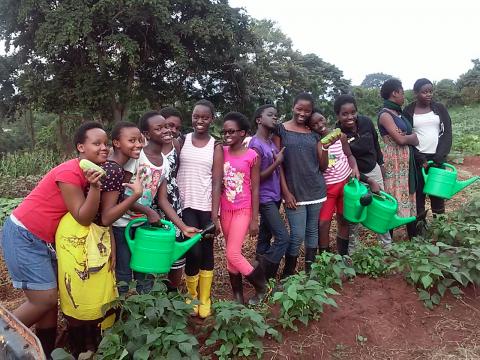According to the African Union, Africa has the youngest population, with almost 200 million people aged 15-24 and each year 10 million young Africans joining the continent’s workforce. This, more than ever before, highlights the challenge of youth unemployment which could also be seen as a great opportunity to encourage youth to be the engine behind the development of new agricultural enterprises — not just in farming but also in research, processing, packaging, retailing of food stuffs and providing Information Communication and Technologies (ICT) services and solutions to agriculture.
At the recently concluded GCARD 3, Dr. Lindiwe Majele Sibanda, the Chief Executive Officer of Food, Agriculture and Natural Resources Policy Analysis Network (FANRPAN), made a definitive statement when she said, “We in Africa depend on agriculture and cannot afford a decline in our already compromised productivity”.
Africa as a continent relies heavily on agriculture yet the youth have taken a step back and left it to the older generation, preferring to pursue “white collar” jobs that can make them quick money. As a result, agriculture as a sector is suffering major setbacks. Getting more African youth in agriculture and boosting support for the region’s vulnerable family farmers will be pivotal to improving food security and economic wellbeing for future generations.
The African Forum for Agricultural Advisory Services (AFAAS), through its country fora, is implementing smart ways to keep agriculture relevant to the youth and keep them interested in it from an early age. The Uganda Forum for Agricultural Advisory Services (UFAAS), for example, in partnership with Gayaza High School, is implementing the schools agricultural innovation platform (SAIP) based on the Integrated Agricultural Research for Development (IAR4D) principles of innovations platforms. The SAIP is an approach where students are imparted with basic practical agricultural skills, facilitated to interact with identified relevant actors and passionately share their experiences with other schools and the communities around the school and beyond their respective home areas.
The SAIP is established to foster a culture of entrepreneurial mindset among the youth in schools. The SAIP is aimed at helping the youth understand and appreciate agriculture as a valuable sector at both micro and macro levels. The SAIP is implemented such that the skills are integrated into other subjects such as ICT and humanities in a practical way to enhance problem based learning.
Figuring out how to feed the world’s quickly growing population is fast becoming a global challenge therefore involving the younger generation early enough in agriculture through innovations such as SAIP will ensure that they are fed for years to come.

